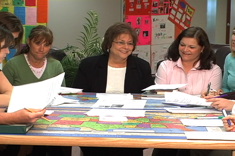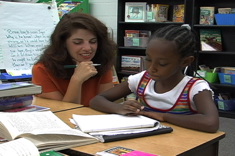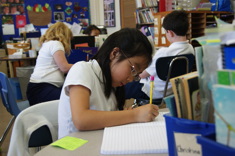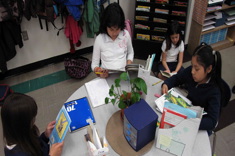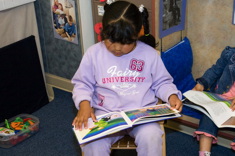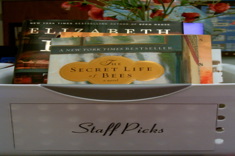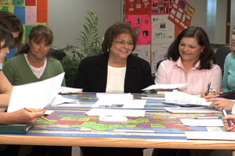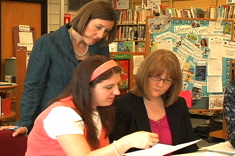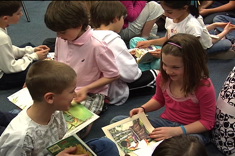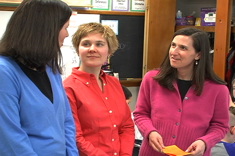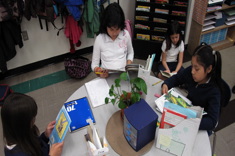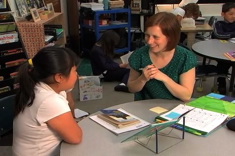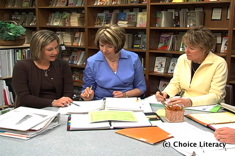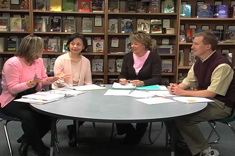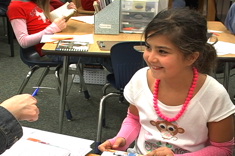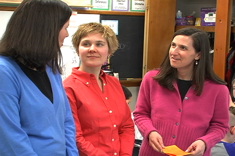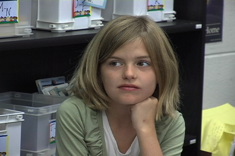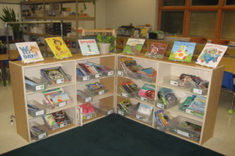Articles
Here is where you’ll find all the latest print features from our contributors. If you’d like to browse specifically by grade level, topic, or contributor, you can use the links in the right sidebar.
Latest Content
Establishing a Routine for Notetaking
We close out the notetaking series with advice on setting notetaking goals.
Learning Curves and Dips: Planning and Goal-Setting for Writing Workshop
Aimee Buckner describes a simple summer planning and goal-setting process she uses to get ready for launching writer's workshop in the fall.
Rethinking Writing Centers
Shari Frost finds writing centers are beloved by many teachers and students. There’s only one problem – very little writing appears to be going on in the centers.
Two or Three Things I Know for Sure: A Teacher Workshop Activity
"Two or Three Things I Know for Sure" is a terrific short workshop activity for study groups or faculty meetings, and it also can be used in partnership discussions with mentors, literacy coaches, and colleagues. The activity gets everyone to explore their bedrock beliefs about teaching – as well as what it takes to change them.
What Are Reading Centers?
Kathy Collins gives a detailed definition of how reading centers are connected to the goals of different reading units of study.
Worth a Thousand Words: Teaching with Wordless Picture Books
Shari Frost and her literacy coaching colleagues explore together how wordless picture books can change the landscape of literacy teaching in K-6 classrooms throughout a school.
The Books We Can’t Live Without in Our Teaching: Resource Round-Up
Literacy experts share their well-loved and well-worn children's and professional books.
The Conversations Inspired by the Questions We Ask
Principal Karen Szymusiak shares her reflections and questions that cause her teachers to question their current practice and lead them to consider authenticity in reading instruction.
Notetaking Series Part III: “Raw” and “Cooked” Notes
In "Raw and Cooked Notes," the value of uncensored notes is presented, as well as a simple strategy for beginning to code and analyze the observations you are jotting down.
Where Have All the Picture Books Gone?
Franki Sibberson shares ways to foster continued enjoyment of picture books with intermediate readers, and highlights some texts with special appeal for older readers in this article which includes a booklist.
Solving Problems Quote Collection
If you need reminders that every problem is an opportunity, check out this stellar quote collection.
The Power of Layered Coaching
Jennifer Allen presents her coaching model for varied and rich support of teachers.
Evaluation Quotes
From Winston Churchill to Shelley Harwayne, there's a range of opinions on evaluation and goal setting in this quote collection.
Rethinking Centers
Are centers essential in classrooms? Katie DiCesare rethinks the centers program in her primary classroom.
Books That Touch the Heart
Is it ever alright for a teacher to cry when reading aloud? Shari Frost and her colleagues select their favorite tearjerker read alouds, and what they’ve learned from sharing them with students.
Notetaking Series, Part IV: What Counts and Writing the Unwritable
Here are some strategies for getting out of notetaking ruts.
Memorable Moments: Two Quick-Write Closure Activities for End-of-the-Year Study Groups and Staff Meetings (TEMPLATES)
Here are two quick and reflective activities for closure at the end of the year.
Got Space?
Jennifer Allen gets creative with space for displays in her literacy coaching work.
Helping Struggling Writers
How can we help students who are stuck when it comes time to write? Franki Sibberson shares a couple new strategies, including a book basket of texts selected by students themselves as useful for sparking writing topics in this photo essay.
Writers on Revision Quote Collection
Our quote collection on revision has many choice quotes for launching study group or class discussions.
Preparing Students for Summer Reading
Franki Sibberson has some great suggestions for jumpstarting students’ summer reading. These ideas work if you are in the last week or two of school, or if you are just beginning a summer enrichment reading program with kids.
Quotes about Commitment to Teaching
Our quote collection on commitment to teaching includes some provocative quotes for generating discussions about teaching fatigue and renewal.
Learning from the Shadows
Jennifer Allen writes about the power of being shadowed by a young teacher, Jeni, for a full day.
Last Words and Next Steps: Closure Activities for Study Groups and Mentoring Programs
Here are some quick closure activities to help you finish out the last study groups and meetings with colleagues on a high note.
Quotes about Content Literacy for Adolescents
Here are some just-right quotes for newsletters and opening meetings.
Putting Ourselves in Our Teaching
Debbie Miller's wonderful essay is great to read when you're feeling rushed, and want to hit the "pause button" to remind yourself of what really matters in the classroom.
More Than Listening Centers: Using Audio Books in Literacy Instruction
Shari Frost sorts through the changing world of audio books, and their resurgence in popularity with smaller, cheaper, and trendier MP3 players. She shares some of the innovative ways literacy coaches and teachers in her network are using audio books.
Favorite Writing Quotes
Quotes to get your creating juices flowing about writing.
Creating a Reflective Culture in Classrooms
Debbie Miller explains how the language we use with students conveys our appreciation for their thinking.
Organizing Book Bins: Letting Kids Help and Plan
Katie DiCesare writes about how children can be enlisted to help in creating and organizing book bins in libraries. But in Katie's classroom, the process of matching books to children begins with "My Stack" – her pile of books that changes daily, linking individual children and texts of interest.
Browse Content By
Type
Category
- Assessment Tools
- Big Fresh Archives
- Booklists
- Choice Numeracy
- Classroom Design
- Common Core
- Community Building
- Conferring
- Content Literacy
- Digital Literacy
- English Language Learners
- Equity
- Family Relations
- Free Samples
- Guiding Groups
- Leadership
- Literacy Coaches
- Mentor Texts
- Minilessons
- New Teacher Mentors
- Podcasts
- Poetry
- Quote Collections
- Reading Strategies
- Self Care
- Struggling and Striving Learners
- Talking and Listening
- Teacher Study Groups
- Teaching Reading
- Teaching Writing
- Word Study and Vocabulary
Author
- Melissa Quimby
- Nawal Qarooni
- Gwen Blumberg
- Julie Cox
- The Lead Learners
- Hannah Tills
- Josie Stewart
- Ruth Metcalfe
- Mallory Messenger
- Becca Burk
- Jodie Bailey
- Vivian Chen
- Mary Brower
- Tiffany Abbott Fuller
- Stephanie Affinito
- Ruth Ayres
- Leigh Anne Eck
- Heather Fisher
- Shari Frost
- Julie Johnson
- Suzy Kaback
- Gigi McAllister
- Shirl McPhillips
- Melanie Meehan
- Cathy Mere
- Debbie Miller
- Tara Barnett and Kate Mills
- Tammy Mulligan
- Dana Murphy
- Bitsy Parks
- David Pittman
- Brenda Power
- Heather Rader
- Matt Renwick
- Mandy Robek
- Christy Rush-Levine
- Gretchen Schroeder
- Jen Schwanke
- Brian Sepe
- Katherine Sokolowski
- Stella Villalba
- Jennifer Vincent
Grade Level
Choice Literacy Membership
Articles
Get full access to all Choice Literacy article content
Videos
Get full access to all Choice Literacy video content
Courses
Access Choice Literacy course curriculum and training

